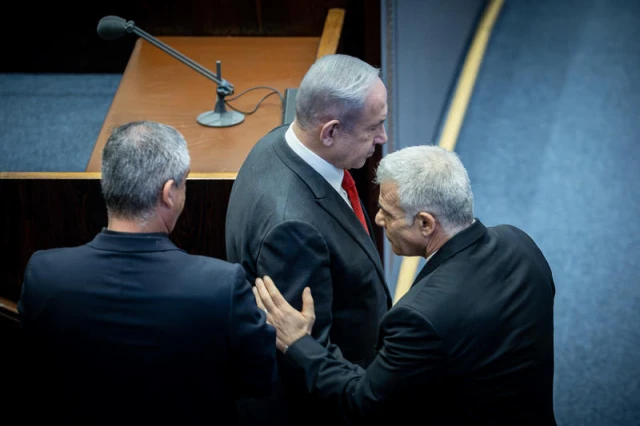Are early elections – and a Netanyahu–Lapid alliance – Israel’s next political shake-up?

Alongside the joy and euphoria sweeping Israel as the remaining living hostages finally came home on Monday, another story may be quietly unfolding behind the scenes. Prime Minister Benjamin Netanyahu – ever the politician – could already be setting the stage for early elections, perhaps as soon as this winter.
"Now that the hostages are back, he may call for early elections," Eric Mandel, founder and director of the Middle East Political and Information Network, told All Israel News. "He won in Gaza, won in Iran, won against Hezbollah, won with Syria… early elections would be good for Bibi."
The prime minister can certainly ride the wave of momentum that has been generated. But it also seems he may already be planting the seeds for his next coalition, and it's unlikely to include Finance Minister Bezalel Smotrich and his far-right Religious Zionist Party, or National Security Minister Itamar Ben Gvir and his extreme-right Jewish Power Party.
Instead, judging from Monday's speeches, Netanyahu may be quietly eyeing a partnership with Opposition Leader Yair Lapid – and perhaps the feeling is mutual.
Lapid delivered a more statesmanlike address than he has in years, perhaps in his entire political career. He avoided taking any shots at Netanyahu or the government. In response, coalition members rose, offering him an unlikely standing ovation.
When Lapid called out the world for its hypocrisy, for demonstrating against Israel over the past two years in London and Rome, in Paris and at Columbia University, he made his position clear: "I do not represent the government; I am the leader of the opposition. And yet I tell you: you were deceived."
He continued, "There was an army and a country fighting in the most complicated conditions imaginable, against terrorists who send their own children to die for a photo op, who use them as human shields. The truth is that a democratic state was attacked by a fanatical terrorist organization. One thousand two hundred people were killed in one day, women were raped, children burned alive, and all the while they played with your minds – selling you the absurd idea that supporting Islamic terror is somehow a liberal value… When you stand with Israel, you stand on the side of justice."
"There must be something going on," said Dan Diker, Jerusalem Center for Security and Foreign Affairs president. "Lapid has been a major opponent of Netanyahu in every way and highly critical of the prime minister. Suddenly, during his speech in the presence of President Donald Trump, he sounded more like a coalition partner than an opposition leader. He praised Trump. He said things that unite the country."
Moreover, Trump hinted that it may be time for Netanyahu to cross the aisle.
During his remarks, Trump told the prime minister it was time "to enjoy the fruits of your labor." Then, turning to Lapid, he said, "Mr. Opposition Leader – he's a very nice opposition leader, I think. He's a nice man, Bibi. He knows what he is doing – a very nice guy. Well, see, now you can be a little bit nicer, Bibi, because you're not at war anymore, Bibi… Only by embracing the opportunities of this moment can we achieve our goal of ensuring that the horrors of recent years will never happen again."
While it's unlikely that Trump sees Netanyahu forming a unity coalition as a top priority – after all, he and his team, including Steve Witkoff and Jared Kushner, are consistently dealing directly with Netanyahu – it could certainly make it easier for Trump's broader vision to be realized.
"There is reason to assess that Trump was subtly suggesting that Israel rethink its coalition structure," Diker told AIN.
From a public relations standpoint, the international media would embrace a unified government. For months, it has amplified every statement made by Smotrich and Ben Gvir a thousandfold, undermining both Netanyahu's and Israel's credibility.
Beyond optics, several of Smotrich and Ben Gvir's core policy goals directly clash with Trump's regional peace vision, particularly their push for sovereignty over parts of Judea and Samaria.
While Netanyahu, in his speech, thanked Trump for recognizing Israel's right to its biblical heartland, he carefully avoided any mention of annexation. For his part, Trump has said publicly that he does not support annexation.
When the first Abraham Accords were signed in 2020, one of the preconditions was that Israel would delay any annexation discussion for at least three years. That time has passed, and talk of annexation has returned to the political stage. However, with Syria, Oman, Indonesia, and even Saudi Arabia potentially joining the Abraham Accords, pursuing that agenda is hardly the moment.
Lapid, by contrast, would likely be a far more flexible partner, someone willing to make concessions where necessary to preserve Israel's alliances and advance its regional interests.
Trump will likely never be as supportive of Israel as he was on Monday, and Netanyahu will need to show flexibility to maintain that relationship. A unity government would not only serve Israel diplomatically but also help heal a country that has endured two years of war and division.
And perhaps most of all, it would serve Netanyahu himself. Netanyahu recognizes the need to reposition himself politically to attract a broader coalition.
Just days ago, Netanyahu's name was met with boos when Witkoff mentioned it on stage at Hostages Square. But this week, many Israelis see him differently if only for a moment. No longer the perpetual warmonger, Netanyahu now appears as a partner in peace, willing to make significant compromises to turn Trump's 20-point plan into reality.
"Netanyahu has always tried to balance political agendas from the center to the far right – that has been both his challenge and his skill," Diker added.
After the last election, he ended up with an ultra-right coalition simply because many parties refused to join him. But Netanyahu has long seen himself as a consensus prime minister and likely wants to reclaim that legacy.
He knows he is in his final stretch. He wants a legacy. And he knows that legacy lies, more than ever, in Washington.
Trump and Netanyahu have become a political power couple – and Netanyahu, ever the strategist, would likely reshape his entire coalition if that's what it takes to keep Trump firmly by his side.
.jpg)
Maayan Hoffman is a veteran American-Israeli journalist. She is the Executive Editor of ILTV News and formerly served as News Editor and Deputy CEO of The Jerusalem Post, where she launched the paper’s Christian World portal. She is also a correspondent for The Media Line and host of the Hadassah on Call podcast.
You might also like to read this:











